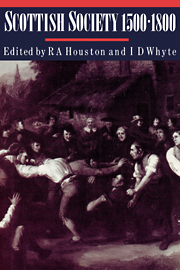Book contents
- Frontmatter
- Contents
- List of tables
- Notes on contributors
- List of abbreviations
- Introduction: Scottish society in perspective
- 1 Population mobility in early modern Scotland
- 2 Scottish food and Scottish history, 1500–1800
- 3 Continuity and change in urban society, 1500–1700
- 4 Women in the economy and society of Scotland, 1500–1800
- 5 Social responses to agrarian ‘improvement’: the Highland and Lowland clearances in Scotland
- 6 ‘Pretense of blude’ and ‘place of thair dwelling’: the nature of highland clans, 1500–1745
- 7 North and south: the development of the gulf in Poor Law practice
- 8 Scotland and Ireland, 1600–1800: their role in the evolution of British society
- 9 Kindred adjoining kingdoms: an English perspective on the social and economic history of early modern Scotland
- Bibliography of printed sources and secondary works
- Index
2 - Scottish food and Scottish history, 1500–1800
Published online by Cambridge University Press: 08 March 2010
- Frontmatter
- Contents
- List of tables
- Notes on contributors
- List of abbreviations
- Introduction: Scottish society in perspective
- 1 Population mobility in early modern Scotland
- 2 Scottish food and Scottish history, 1500–1800
- 3 Continuity and change in urban society, 1500–1700
- 4 Women in the economy and society of Scotland, 1500–1800
- 5 Social responses to agrarian ‘improvement’: the Highland and Lowland clearances in Scotland
- 6 ‘Pretense of blude’ and ‘place of thair dwelling’: the nature of highland clans, 1500–1745
- 7 North and south: the development of the gulf in Poor Law practice
- 8 Scotland and Ireland, 1600–1800: their role in the evolution of British society
- 9 Kindred adjoining kingdoms: an English perspective on the social and economic history of early modern Scotland
- Bibliography of printed sources and secondary works
- Index
Summary
The purpose of this chapter is, firstly, to discuss a change in the nature of Scottish diet between the late Middle Ages and the mid-eighteenth century, a change which decreased the total consumption of animal-based foods per head and increased that of grain-based food. It is not our intention to present a detailed history of Scottish diet for the period in all its complexity nor to measure its nutritional adequacy: the latter task is one to which we shall return elsewhere. Nor is it our intention to compare fully Scottish dietary experience with that of other countries and regions: that interesting work must be left to a time when there is wider agreement on methodology in analysing diets, more research on change in the long term and, above all, a stronger revival of interest in early modern dietary history in Scandinavia and England on the part of economic historians.
The sources we have used for this part of the paper are as imperfect as time has left them. Before the seventeenth century they are almost entirely qualitative. For the seventeenth and eighteenth centuries they improve slightly, in so far as certain detailed diets have survived enabling a few quantitative analyses to be made of the food provided in selected institutions. We have disregarded, for these immediate purposes, the food set before the upper classes at court, on the top tables of noble households and at universities, since our focus is rather upon the experience of the commonality.
- Type
- Chapter
- Information
- Scottish Society, 1500–1800 , pp. 59 - 84Publisher: Cambridge University PressPrint publication year: 1989
- 4
- Cited by



